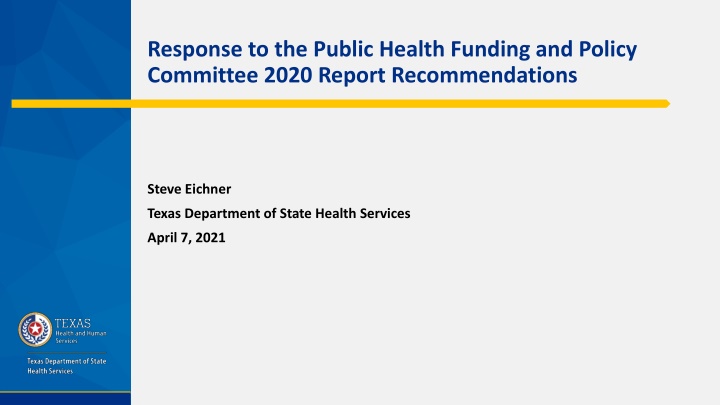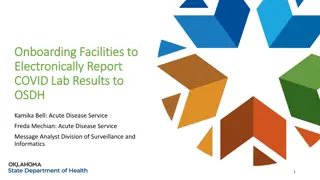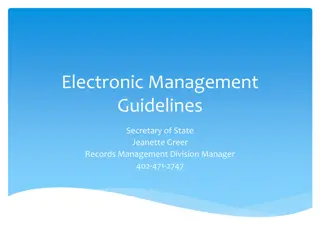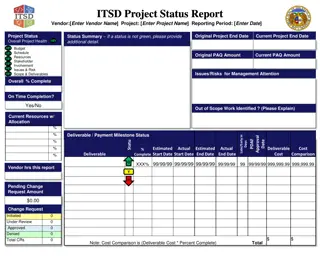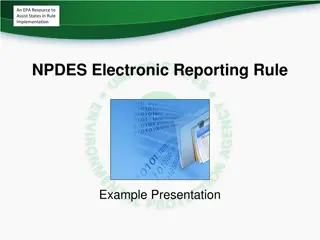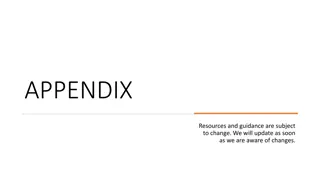DSHS Implementation of Electronic Lab Reporting: Current Status
DSHS's commitment to implementing the Public Health Funding and Policy Committee's recommendations on electronic laboratory reporting (ELR) is outlined, including the status of Recommendation A and the current infrastructure in place for data collection and sharing.
Download Presentation

Please find below an Image/Link to download the presentation.
The content on the website is provided AS IS for your information and personal use only. It may not be sold, licensed, or shared on other websites without obtaining consent from the author.If you encounter any issues during the download, it is possible that the publisher has removed the file from their server.
You are allowed to download the files provided on this website for personal or commercial use, subject to the condition that they are used lawfully. All files are the property of their respective owners.
The content on the website is provided AS IS for your information and personal use only. It may not be sold, licensed, or shared on other websites without obtaining consent from the author.
E N D
Presentation Transcript
Response to the Public Health Funding and Policy Committee 2020 Report Recommendations Steve Eichner Texas Department of State Health Services April 7, 2021
Statutory Background Chapter 117, Texas Health and Safety Code: Established the Public Health Funding and Policy Committee (PHFPC) Requires the Committee to produce an annual report with recommendations to the Department of State Health Services (DSHS). Requires DSHS to produce a report on the status of the implementation of the PHFPC s recommendations. 2
2020 PHFPC Report and Response Topic Areas The 2020 PHFPC report included nine recommendations in the areas below. DSHS has responded to each recommendation. Electronic Laboratory Reporting (ELR) COVID-19 Vaccine Distribution COVID-19 Funding Allocation This presentation is focused on the ELR recommendations. 3
DSHS Commitment to Collaboration and Implementation of Recommendations DSHS is committed to explore methods of implementing the PHFPC s recommendations. DSHS reserves the decision not to implement a recommendation based on: A lack of available funding. Evidence that the recommendation is not in accordance with prevailing epidemiological evidence, variations in geographic/population needs, best practices, or evidence-based interventions related to the populations to be served. Evidence that implementing the recommendation would violate state or federal law. Evidence that the recommendation would violate federal funding requirements. 4
Electronic Laboratory Report Recommendations PHFPC Recommendation A The Public Health Funding and Policy Committee (PHFPC) recommends that the Department of State Health Services (DSHS) should ensure electronic lab reporting from laboratories and hospital systems feed directly to local health departments (LHDs), Public Health Regions (PHRs) and the DSHS Central Office for all reportable conditions. 5
DSHS Current Status Regarding Recommendation A DSHS operates a robust implementation of a NEDSS-Based System (NBS) (NEDSS= National Electronic Disease Surveillance System) System recently upgraded to new hardware, latest version of software. Recently moved to an environment where additional capacity can be added quickly, as needed. Data is received electronically from laboratories and other entities. Local health entities (LHDs) have access to all data received by DSHS relevant to their jurisdiction. LHDs have real-time, web-based access to notifiable data maintained by DSHS in NEDSS. COVID-19 data mart is updated every two (2) hours. Additional system augmentation, including electronic case reports, is planned. 6
Current Status Related to Recommendation A Many submitters are not using best, nationally-preferred standard (HL7). Laboratories were not specifically included in federal EHR incentive programs. Laboratory systems may not be designed to process all required data. Data is submitted in alternate, comma-separated value format. Alternative format is more prone to missing/malformed/incomplete data. DSHS staff audits submitted data to ensure it meets quality standards Resubmission of corrected data by the lab is required. Some labs do not report electronically, instead faxing results. This puts burden on public health staff to enter data. State statute does not require electronic submission of data. 7
Improvement Strategies for Recommendation A Collaborate with health care providers, local health departments, and other entities. Leverage health information exchanges (HIES) to assist in providing missing data and data conversion services. Improve communications on standard utilization. Support health care providers in implementing standards. Clarify reporting requirements in Texas Administrative Code and applicable law. 8
Electronic Laboratory Report Recommendations PHFPC Recommendation B PHFPC recommends that DSHS should ensure complete data sets by implementing data quality-checking tool. DSHS Current Status Regarding Recommendation B Rigorous algorithm currently in place. If patient address missing, provider address used to assign jurisdiction. Balance of completeness and timeliness. Data currently submitted through multiple providers systems requiring modifications. 9
Improvement Strategies for Recommendation B Strategies to improve data quality Use of HL7 to improve quality of data submitted. Clarity on data expectations through new publications and provider education. Collaborating with health information exchanges to provide missing data. 10
Electronic Laboratory Report Recommendations PHFPC Recommendation C PHFPC recommends that DSHS should develop and implement a standardized data format for laboratories reporting line lists DSHS Current Status Regarding Recommendation C DSHS requires the use of standardized reporting by laboratories and other providers. DSHS standards are consistent with national standards. Standards are readily available. DSHS provides training and technical assistance to laboratories in implementing standards. DSHS collaborates with national organizations on developing standards. 11
Electronic Laboratory Report Recommendations PHFPC Recommendation D PHFPC recommends that DSHS should implement regular compliance reports related to mandated reporting requirements for laboratories and hospital systems. The report should include, at a minimum the quantity of electronic lab results, the frequency of incomplete data fields, compliance with a standardized data format of line lists, and average turnaround time from date of specimen collection to date results received by DSHS. DSHS Response to Recommendation D DSHS does not directly regulate laboratories in Texas. DSHS is authorized to establish reporting criteria for notifiable conditions. DSHS can explore developing reports based on information received from laboratories. DSHS can approach the relevant state and federal authorities responsible for regulatory oversight. 12
Electronic Laboratory Report Recommendations PHFPC Recommendation E PHFPC recommends that DSHS should augment electronic lab reporting for reportable conditions to offer interoperability and compatibility between local health departments and DSHS. DSHS Response to Recommendation E Data in NBS is currently downloadable by local health departments. Providers using specified standards can submit data to NBS and it will be routed to the appropriate jurisdiction. DSHS is collaborating with local health departments to improve interoperability between DSHS and local systems. Adherence to standards is critical. 13
Electronic Laboratory Report Recommendations PHFPC RecommendationF PHFPC recommends that DSHS should assist local health departments with resources to develop and enhance electronic lab reporting infrastructure, where needed. DSHS Response ro Recommendation F DSHS distributes funding to LHDs where practicable. Sharing technology resources and infrastructure may be more effective than duplicating technology. Coordination of implementation strategies will improve performance. Maintenance of system is required for long-term success. Maintaining compliance with applicable messaging standards. Maintaining training and staffing levels is necessary for provider support. 14
Electronic Laboratory Report Recommendations PHFPC Recommendation G PHFPC recommends that DSHS should ensure required annual training on mandatory reporting requirements for all laboratories prior to certification to provide laboratory services in Texas. DSHS Response to Recommendation G DSHS currently has limited authority over laboratories in Texas. Role does not currently include involvement in certification processes. DSHS informatics team works closely with laboratories in onboarding. DSHS will explore working with certifying authorities to determine what changes can be made in certification requirements. Current law does not specify that all necessary data be provided to the laboratory by the entity ordering the test. This may limit the ability of the laboratory to have all requisite information. 15
Thank You/Contact Thank You! Contact Steve Eichner Health Information Technology Lead Texas Department of State Health Services steve.eichner@dshs.texas.gov Ph: 512.221.5632 17
